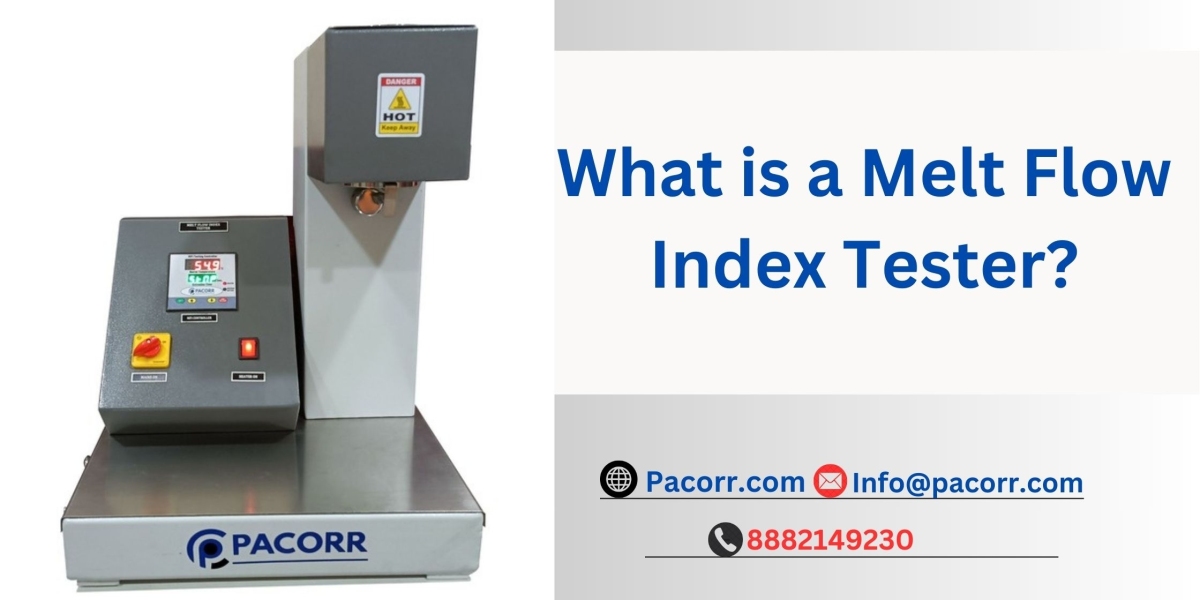The Melt Flow Index Tester is an essential tool in the world of polymer testing, used for determining the flow characteristics of thermoplastic materials.
What is a Melt Flow Index Tester?
The Melt Flow Index (MFI) is a crucial parameter for thermoplastic polymers, which refers to the rate at which polymer material flows when subjected to heat and pressure. This is an important factor in understanding the viscosity and meltability of the material. The Melt Flow Index Tester is designed to determine the MFI by measuring the amount of polymer that flows through a die over a set time, under specific conditions of temperature and load.
Typically, this tester uses a small quantity of polymer pellets, applying a standard weight to the material while heating it to a pre-defined temperature. The material is forced through a die, and the resulting flow is measured. This helps manufacturers gauge the polymer's flow behavior and assess its processing characteristics.
Key Features of Melt Flow Index Tester
Precise Measurement of Melt Flow Rate (MFR): The Melt Flow Index Testing Machine provides accurate results for determining the Melt Flow Rate (MFR), a critical property for assessing the processability of materials.
- Adjustable Temperature and Pressure Control: The tester offers adjustable settings for both temperature and pressure, allowing you to simulate real-world processing conditions.
- Wide Application Range: It is compatible with a broad range of thermoplastics, including polyolefins, polyethylene, and polypropylene.
- User-Friendly Interface: With an easy-to-use interface, this device enables seamless operation, making it an ideal solution for laboratories and quality control departments.
- High Accuracy and Reliability: The Melt Flow Index Tester provides consistent and reproducible results, ensuring the highest quality testing for polymers.
How Melt Flow Index Tester Benefits Manufacturers
- Optimizes Production Process
Knowing the melt flow rate helps manufacturers fine-tune their production processes. By measuring the Melt Flow Index Testing of materials, manufacturers can optimize processing conditions such as temperature and pressure. This ensures that the polymer is processed efficiently, reducing waste and improving the overall yield.
- Enhances Material Quality Control
The Melt Flow Index Tester is an essential part of a robust quality control system. By regularly testing the melt flow rate of incoming raw materials, manufacturers can maintain consistent product quality. This ensures that only materials that meet the specified standards are used, avoiding defects in the final product.
- Supports Product Development
For R&D teams, the Melt Flow Index Tester is invaluable in evaluating new polymer formulations. By adjusting the temperature, pressure, and other parameters, researchers can assess how different additives, fillers, or processing conditions impact the melt flow rate. This data is crucial for developing new products or improving existing ones.
Applications of Melt Flow Index Tester
The Melt Flow Index Tester plays a significant role across various industries, especially where polymers are used extensively. Below are some of its primary applications:
- Plastics Industry
In the plastics industry, the Melt Flow Index Tester is used to test a wide variety of polymers, such as polyethylene, polypropylene, polystyrene, and ABS. By determining the melt flow rate, manufacturers can predict how well a material will behave during molding, extrusion, and other processing operations. The Melt Flow Index Tester Price helps ensure that the material flows smoothly through molds, creating high-quality plastic parts.
- Automotive Manufacturing
Polymers are widely used in automotive manufacturing, especially in components such as bumpers, dashboards, and interior panels. The Melt Flow Index Tester helps automotive manufacturers ensure that their materials meet the strict performance standards required for high-quality production. By using MFI testing, manufacturers can prevent issues such as material defects, warping, and poor surface finish.
- Packaging Industry
The packaging industry relies heavily on plastics for creating containers, films, and other packaging materials. The Melt Flow Index Tester helps ensure that the polymers used in packaging products have the appropriate flow characteristics for easy processing. This guarantees that packaging materials are strong, durable, and easy to mold, offering the perfect balance between processability and product performance.
- Electrical and Electronics Manufacturing
In electronics, the flow behavior of materials such as polycarbonates and epoxy resins is crucial. The Melt Flow Index Tester enables manufacturers to ensure that these materials can be easily molded and form accurate, high-quality electrical components. By testing the Melt Flow Teste, manufacturers can prevent production delays and defects in critical electronic products.
Why Choose Pacorr’s Melt Flow Index Tester?
At Pacorr Testing Instruments, we take pride in providing high-quality testing instruments that help manufacturers achieve the highest standards of quality control. Our Melt Flow Index Tester is engineered to offer precise, reliable, and repeatable results. With user-friendly controls and customizable settings, it provides manufacturers with the ability to optimize their processes and improve material performance. Whether you are testing polyolefins, thermoplastics, or advanced composites, our Melt Flow Index Tester is the perfect tool for your laboratory or production facility.
Conclusion
The Melt Flow Index Testing Machine is a crucial instrument for manufacturers working with thermoplastic materials. It provides valuable insights into the flow characteristics of materials, allowing manufacturers to optimize their processes, improve material quality, and ensure consistent product performance. With its diverse applications across industries such as plastics, automotive, packaging, and electronics, the MFI tester is a vital tool for any company working with polymers.
At Pacorr Testing Instruments, we provide state-of-the-art testing solutions, including the Melt Flow Index Tester, to meet the evolving needs of industries worldwide. With precise measurements and user-friendly interfaces, our products empower manufacturers to maintain high standards of quality and efficiency in their operations. Contact us today to learn more about how our testing instruments can support your production process.
FAQs About Melt Flow Index Tester
- What is the Melt Flow Index (MFI)?
The Melt Flow Index (MFI) is a measure of how easily a polymer flows when subjected to heat and pressure. It helps determine the processability and quality of the polymer.
- Why is Melt Flow Index important for manufacturers?
The MFI helps manufacturers determine the right processing conditions for thermoplastics, ensuring consistent product quality and efficient production.
- Can the Melt Flow Index Tester be used for all types of plastics?
Yes, the Melt Flow Index Tester can be used to measure the flow characteristics of a wide range of thermoplastic materials, including polyethylene, polypropylene, and polystyrene.
- How does the Melt Flow Index affect product quality?
A higher MFI indicates that a polymer flows more easily, which can affect the molding process and the strength of the final product. Knowing the MFI allows manufacturers to control material quality better.
- Can I use the Melt Flow Index Tester for research and development?
Yes, the Melt Flow Index Tester is an essential tool for R&D teams looking to develop new polymer formulations or improve existing materials by adjusting processing conditions based on MFI data.







